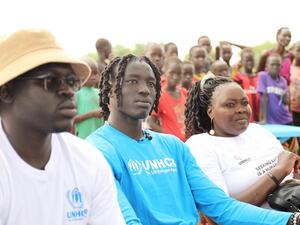Birth certificate opens the door to school in Côte d'Ivoire
Birth certificate opens the door to school in Côte d'Ivoire

Proud fathers in Goya, western Côte d'Ivoire, hold up the birth certificates that will allow their children to start school.
GOYA, Côte d'Ivoire, September 26 (UNHCR) - Last week, hundreds of thousands of children went back to school across Côte d'Ivoire as a new academic year got under way. Like most Ivorian parents, Simon Konan Kouassé wants his five children to get a proper education.
But, until recently, this seemed almost impossible for his youngest daughter, three-year-old Agath, who was forcibly displaced along with her family by the conflict that tore through this West African country following the November 2010 presidential election.
"I wanted my girl to be able to go to school, but she was born 10 days before the war," says Simon, explaining that Agath's birth was never registered because the family was on the run from their village, Goya, in western Côte d'Ivoire.
For Agath, this left her in limbo: without an identification document or proof of nationality the child could not enrol in pre-school or access many other basic rights. Like her, many children in Côte d'Ivoire displaced by violence have never been registered at birth, while others lost their birth certificates because they had to flee for their lives.
For the past two decades, the deepest roots of once prosperous Côte d'Ivoire's devastating and ruinous civil war are linked to the question of identity: the conflict over who is a "real" citizen of the country. Documentation, such as birth certificates and identity cards have therefore been vital to prove who "belongs."
But as peace and stability return to Côte d'Ivoire, and thousands continue returning home, the government is actively addressing the issue. To help people like Agath and her parents, UNHCR and its government refugee protection partner, SAARA (Service d'Aide et d'Assistance aux Réfugiés et Apatridiés], have been working to ensure that people without documentation not only understand the importance of having proper identification, but also how to get it.
"We have been conducting meetings in communities and showing a film to raise awareness on the importance of documentation," says Joseph Djitro, a UNHCR field worker. "We explain that children need papers to enrol in school and register for exams. We also tell them that even adults need identification to obtain a driver's licence or to open a bank account."
Fortunately, Simon participated in these sessions and took the necessary steps to register Agath. And one month later, he had her birth certificate in hand.
She is one of 88 children who have received birth certificates in Goya this year, meaning that they are all heading to school today. That said, some 700 people in neighbouring villages are still waiting for their requests to be processed - a procedure that can take more than one month, largely due to insufficient numbers of government staff in these remote areas.
Today in Côte d'Ivoire, there are an estimated 700,000 people who are either undocumented, stateless or in the process of having their nationality verified. Many descend from agricultural workers who migrated to Côte d'Ivoire from others parts of West Africa during colonial times or shortly after the nation's independence in 1960. Many children and adults have not acquired Ivorian nationality, yet do not hold the nationality of any other state, either.
Côte d'Ivoire recently adopted legislation to accede to the two UN conventions on statelessness - the 1954 Convention relating to the Status of Stateless Persons and the 1961 Convention on the Reduction of Statelessness. It has also reformed its nationality law to make it easier for eligible people to naturalize.
These steps will not only benefit hundreds of thousands of undocumented people in Côte d'Ivoire but will also help resolve identity questions, which will ultimately facilitate reconciliation and social cohesion.
Meanwhile, Simon has one more child to get into school. He is waiting to hear back any day from the local tribunal about his application for a birth certificate for his last undocumented child. If the answer is positive, as expected, all five of Simon's children will be in possession of proper identification, opening the door to school.
"A birth certificate is crucial for education," says Simon. For him, this document is so much more than a piece of paper. It's a means to secure his child's future.
By Kathryn Mahoney in Goya, Côte d'Ivoire








